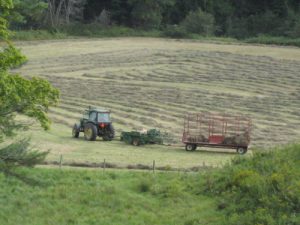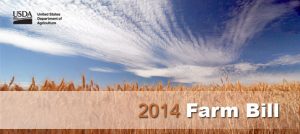Farm Scoop – July 2014
Is Endophyte a Concern for Maine Livestock Producers?
This spring a few beef producers contacted UMaine Extension concerned that Endophyte infected fescue or perennial ryegrass may be adversely affecting their pregnant cattle. In other states Endophyte (fungus) infected pastures can cause abortions and/or poor weight gains in cattle and other livestock that graze these grasses.
Donna Coffin, Extension Educator received funding for a research project to try to assess if our fescue or ryegrass pastures or haylands are infected, how widespread the infected grasses are in Maine and how much of a concern it should be for livestock producers. If you have stands that are predominantly fescue or ryegrass and would like to have them tested for free for endophyte please contact her at 207.564.3301 or by email at Donna Coffin.
USDA Announces Funding Availability for Biomass Material into Energy
The U.S. Department of Agriculture (USDA) began accepting applications June 16 from energy facilities interested in receiving forest or agricultural residues to generate clean energy. The support comes through the Biomass Crop Assistance Program (BCAP), which was authorized by the 2014 Farm Bill.
BCAP provides financial assistance to farmers and ranchers who establish and maintain new crops of energy biomass, or who harvest and deliver forest or agricultural residues to a qualifying energy facility. Of the total $25 million per year authorized for BCAP, the 2014 Farm Bill provides up to 50 percent ($12.5 million) each year for matching payments for the harvest and transportation of biomass residues. BCAP matching payments will resume this summer, while crop incentives will begin in 2015. Some matching payments will support the removal of dead or diseased trees from National Forests and Bureau of Land Management public lands. This will be turned into renewable energy while reducing the risk of forest fire. Agriculture residues, such as corn cobs and stalks, also may qualify as energy-producing feedstock.
The USDA Farm Service Agency (FSA), which administers BCAP, will begin accepting applications from biomass conversion facilities beginning June 16, 2014, through July 14, 2014. Information on funding availability can be found in the Federal Register notice. For more details on applications and deadlines on BCAP, visit a local FSA county office or go online.
Hay & Straw Directory
June has been a great month for making hay. If you have excess or are the position to sell hay or straw, consider using the Maine Hay and Straw Directory. It is free to use. More information is available online, or call Cooperative Extension 1.800.287.1426.
Preserving the Harvest July Workshops Announced
Ever wonder about preserving your garden produce? Learn how at a University of Maine Preserving the Harvest class. Visit the UMaine Cooperative Extension Food and Health page for a listing of current workshops
Maine Home Garden News July Issue Announced
Gardening advice by the month throughout the growing season! Sign up for gardening information, timely tips and research-based articles written by UMaine Extension staff and Master Gardener Volunteers at Maine Home Garden News
Have you Considered Agritoursim?
Agritoursim is one way to generate more income from the farm. But it is not for every farm. Learn more about the benefits and drawbacks by visiting a website hosted by Rutgers University. The site was initiated to train agriculture service providers. However, much of the information posted can be used directly by farmers and growers. At the site, you will find short videos, training module, fact sheets and worksheets.
Tractor Safety on Public Roads
Consider a safety check-in and conversation with your family members or employees regarding operating tractors on public roads.
Maine Farms: Life and Business in Balance
The Maine Family Farms: Life and Business in Balance series recognizes that the needs of farmers at each various life stage are unique, as choices about farming practices, child rearing, business growth, and succession planning enter into decision making. This series consists of five fact sheets plus an introductory fact sheet that can purchased/downloaded individually or as a series. Click here to view
Retail price: FREE DOWNLOAD; color printout $3.00 entire series / $0.50 – $0.75 each
Contact person: Leslie Forstadt and Tori Jackson
Publisher: UMaine Extension
To order: by email extension.orders@maine.edu or call 207.581.3792 .
To view all the publications:
- Maine Family Farms: Life and Business in Balance Introduction
- Why “Thank You” Matters: Expressing Appreciation
- Running Successful Farm-Family Meetings
- Farm and Family “Finding Balance“
- Understanding Roles in the Farm Family
- Recognizing the Signs of Farm Family Stress
Backyard Locavore Day
Backyard Locavore Day scheduled for August 9, Rain or Shine. This is a unique one day educational event. Gain knowledge on food preservation and gardening from UMaine Extension’s Master Food Preservers and Master Volunteers.
NRCS Announces Application Deadline for Conservation Programs
The USDA Natural Resources Conservation Service (NRCS) has announced the application deadline dates for two of its conservation programs — the Environmental Quality Incentives Program and the Agricultural Management Assistance Program. The Fiscal Year 2015 application deadline for both of these programs is August 15, 2014.
Agricultural producers and foresters are encouraged to sign up now for the Environmental Quality Incentives Program (EQIP), which provides financial and technical assistance to address varying natural resource priorities. The Fiscal Year 2015 funding consideration application deadline for most EQIP fund pool categories will be August 15, 2014. This does not include the EQIP National Water Quality Initiative and Conservation Innovation Grants. These deadlines are yet to be determined.
The August 15, 2014 deadline for 2015 funding consideration is for both applications for EQIP local Field Office fund pool categories (such as animal waste, cropland, forestry, seasonal high tunnels, pasture, and wildlife) and the statewide fund pool categories (Beginning Farmer, Socially Disadvantaged, Tribal Projects, Water Conservation/Irrigation, Aquatic Organism Passage Projects, Conservation Activity Plans, On-Farm Energy and Organic). The August 15, 2014 signup deadline is an extension to the previously posted July 1, 2014 deadline for the EQIP local Field Office fund pool, or “general” categories.
Agricultural producers are also encouraged to sign up now for the Agricultural Management Assistance Program (AMA), which also has a Fiscal Year 2015 funding consideration application deadline of August 15, 2014. AMA assists agricultural producers to manage risk and voluntarily address issues such as water management, water quality, and erosion control by incorporating conservation practices into their farming operations. For 2015, Maine NRCS will again be offering financial assistance for irrigation systems and introducing an opportunity for funding deer exclusion fencing for orchards through the AMA program.
There is a continuous, year-round sign-up for these two programs, but applications submitted by August 15, 2014 will be considered for funding in Fiscal Year 2015. Proposals submitted after that date will be held for Fiscal Year 2016 funding consideration.
Interested landowners should visit their local NRCS office located at the USDA Service Center to determine eligibility. USDA Service Centers are listed online, or in the telephone book under United States Government, Agriculture Department. For more information on EQIP and AMA, please visit the NRCS website.
New USDA Website for Beginning Farmers
 New Farm Bill measures and other policy changes to improve the financial security of new and beginning farmers and ranchers. Harden also unveiled www.usda.gov/newfarmers, a new website that will provide a centralized, one-stop resource where beginning farmers and ranchers can explore the variety of USDA initiatives designed to help them succeed.
New Farm Bill measures and other policy changes to improve the financial security of new and beginning farmers and ranchers. Harden also unveiled www.usda.gov/newfarmers, a new website that will provide a centralized, one-stop resource where beginning farmers and ranchers can explore the variety of USDA initiatives designed to help them succeed.
“New and beginning farmers are the future of American agriculture,” Said Deputy Secretary Harden. “The average age of an American farmer is 58 and rising, so we must help new farmers get started if America is going to continue feeding the world and maintain a strong agriculture economy. The new policies announced today will help give beginning farmers the financial security they need to succeed. Our new online tool will provide one-stop shopping for beginning farmers to learn more about accessing USDA services that can help their operations thrive.”
USDA’s new farmer website has in depth information for new farmers and ranchers, including: how to increase access to land and capital; build new market opportunities; participate in conservation opportunities; select and use the right risk management tools; and access USDA education, and technical support programs. These issues have been identified as top priorities by new farmers. The website will also feature instructive case studies about beginning farmers who have successfully utilized USDA resources to start or expand their business operations.
Today’s policy announcements in support of beginning farmers and ranchers include:
- Waiving service fees for new and beginning farmers or ranchers to enroll in the Non-Insured Crop Disaster Assistance Program (NAP) for the 2014 crop year. NAP provides risk management tools to farmers who grow crops for which there is no crop insurance product. Under this waiver, announced via an official notice to Farm Service Agency offices, farmers and ranchers who already enrolled in NAP for the 2014 crop year are eligible for a service fee refund.
- Eliminating payment reductions under the Conservation Reserve Program (CRP) for new and beginning farmers which will allow routine, prescribed, and emergency grazing outside the primary nesting season on enrolled land consistent with approved conservation plans. Previously, farmers and ranchers grazing on CRP land were subject to a reduction in CRP payments of up to 25 percent. Waiving these reductions for new and beginning farmers will provide extra financial support during times of emergency like drought and other natural disasters. USDA is an equal opportunity provider and employer. To file a complaint of discrimination, write: USDA, Office of the Assistant Secretary for Civil Rights, Office of Adjudication, 1400 Independence Ave., SW, Washington, DC 20250-9410 or call (866) 632-9992 (Toll-free Customer Service), (800) 877-8339 (Local or Federal relay), (866) 377-8642 (Relay voice users).
- Increasing payment rates to beginning farmers and ranchers under Emergency Assistance for Livestock, Honeybees and Farm-Raised Fish Program (ELAP). Under this provision, beginning farmers and ranchers can claim up 90 percent of losses for lost livestock, such as bees, under ELAP. This is a fifty percent increase over previously available payment amounts to new and beginning farmers.
 In the near future, USDA will also announce additional crop insurance program changes for beginning farmers and ranchers — including discounted premiums, waiver of administrative fees, and other benefits. These policy announcements are made possible through the 2014 Farm Bill, which builds on historic economic gains in rural America over the past five years, while achieving meaningful reform and billions of dollars in savings for the taxpayer. Since enactment, USDA has made significant progress to implement each provision of this critical legislation, including providing disaster relief to farmers and ranchers; strengthening risk management tools; expanding access to rural credit; funding critical research; establishing innovative public-private conservation partnerships; developing new markets for rural-made products; and investing in infrastructure, housing and community facilities to help improve quality of life in rural America. For more information, visit www.usda.gov/farmbill.
In the near future, USDA will also announce additional crop insurance program changes for beginning farmers and ranchers — including discounted premiums, waiver of administrative fees, and other benefits. These policy announcements are made possible through the 2014 Farm Bill, which builds on historic economic gains in rural America over the past five years, while achieving meaningful reform and billions of dollars in savings for the taxpayer. Since enactment, USDA has made significant progress to implement each provision of this critical legislation, including providing disaster relief to farmers and ranchers; strengthening risk management tools; expanding access to rural credit; funding critical research; establishing innovative public-private conservation partnerships; developing new markets for rural-made products; and investing in infrastructure, housing and community facilities to help improve quality of life in rural America. For more information, visit www.usda.gov/farmbill.
The Deputy Secretary made these announcements at the inaugural meeting of the reconvened Beginning Farmer and Rancher Advisory Committee held at the University of California Davis, California. This Advisory Committee, composed of 20 members, including Extension agents, lenders, farmers, ranchers and academics will meet through 2015 to learn, discuss, and formulate recommendations to USDA on how to support new and beginning farmers.
Additional information about USDA actions in support of beginning farmers and ranchers is available online.
